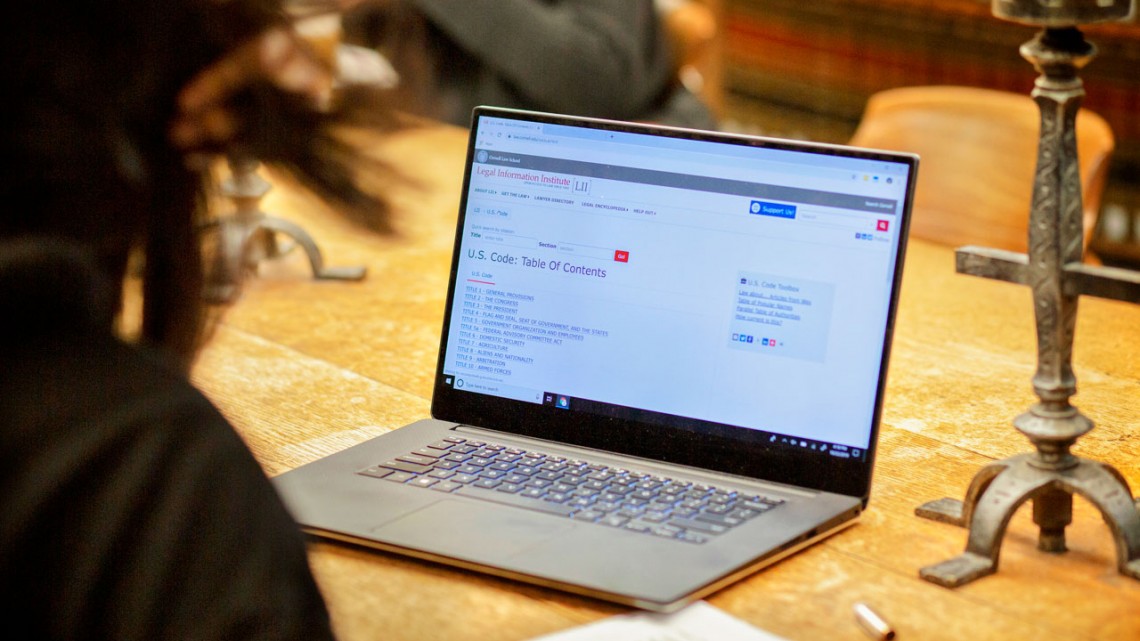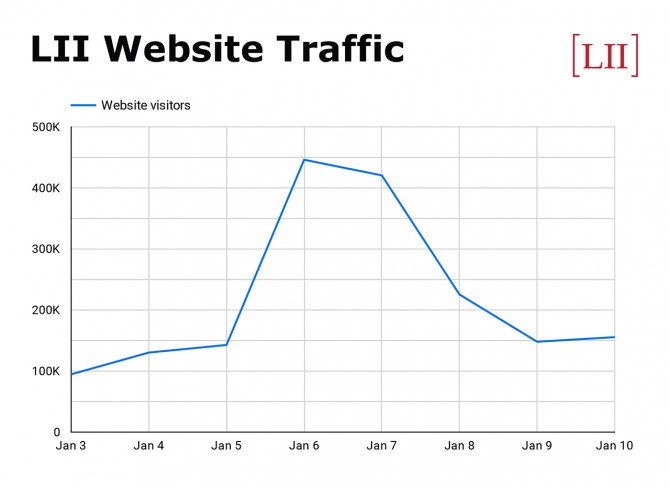
A student looks at Cornell Law School's Legal Information Institute online.
Institute breaks record in 2020, making laws easy to access
By James Dean
As Congress prepared to certify the results of the November presidential election on Jan. 6, the law governing the counting of electoral votes was a trending topic on Cornell Law School’s Legal Information Institute (LII), a pioneer in providing open access to U.S. legal information online.
Those topics changed abruptly when a mob stormed the U.S. Capitol that afternoon: The Constitution’s Twenty-Fifth Amendment became the website’s most visited page, along with the sections of the U.S. Code criminalizing rebellion or insurrection (18 USC §2383), seditious conspiracy (18 USC §2384) and advocating the overthrow of government (18 USC §2385).
The more than 542,000 unique visitors to LII on Jan. 6, and 516,000 the next day, represented the site’s two busiest days since the Supreme Court handed down Bush v. Gore two decades ago. The heavy traffic continued the trend from a record-setting 2020, when LII welcomed roughly 39 million unique visitors – up from 33 million the year before – boosted by a steady stream of major headlines: impeachment, pandemic, anti-racism protests and the contested presidential election, to name a few.
Co-directors Sara Frug and Craig Newton, J.D. ’07, said the growing traffic has helped validate the institute’s theories, techniques and mission.
“We consider ourselves researchers,” Newton said, “and we’re looking for ways to make the law more available to more people.”
Run by a team of eight technologists and legal experts, the nonprofit institute founded in 1992 by Thomas Bruce and Peter Martin, the Jane M.G. Foster Professor of Law, emeritus, and then-dean of Cornell Law, set out to enable everyone “to read and understand the laws that govern them, without cost.”
In addition to the U.S. Code compiling all federal laws, LII resources include the U.S. Constitution and U.S. Constitution Annotated (a Congressional Research Service publication), the Code of Federal Regulations and federal rules of procedure, along with original content including a Wikipedia-like legal dictionary and encyclopedia, and commentary including Supreme Court case previews.
The laws, regulations, legal definitions, cases and key subjects are indexed, cross-referenced and explained in ways that make them easier to navigate and understand. Those enhancements – strengthened by recent accessibility improvements – over time established LII as a top result in Google searches about federal law, its biggest source of traffic.
At the end of 2020, with support from Public.Resource.Org, LII published one of the first free online publications of regulations in all 50 states, making it easier, for example, to find state-level rules about absentee ballots. “This project has the potential to have an enormous impact, so we’re very excited about it,” Frug said.
Nearly a year before the recent violence at the Capitol, another event there sparked LII’s previous high traffic mark of more than 434,000 visitors, on Feb. 5, 2020. After Speaker of the House Nancy Pelosi ripped up her copy of President Donald Trump’s State of the Union speech upon its conclusion, the site registered more than 208,000 views the next day of the law prohibiting “concealment, removal, or mutilation generally” of government records (18 USC §2071).
Beyond that episode, the institute’s 2020 traffic highlighted its real-world impact as visitors from law professionals and journalists to small business owners and students sought help making sense of sometimes life-or-death matters.
During impeachment proceedings, readers pored over commentary and U.S. Constitution Annotated entries on impeachment, separation of powers and bribery, and researched laws on obstruction of justice, treason and whistleblower complaints, the institute noted in its 2020 annual report.
The coronavirus pandemic prompted people to look up federal regulations on eligibility for the Small Business Administration’s Paycheck Protection Program loans – viewed nearly 33,000 times in April, up 38,000% from a year earlier. The section concerning federal unemployment insurance was viewed almost 85,000 times in April, up more than 300,000%.
Following the police killings of Black Americans including George Floyd and Breonna Taylor, visitors flocked to LII content on qualified immunity and no-knock warrants, articles on martial law and the civilian commander-in-chief, and laws on respect for the flag and the destruction of veterans’ memorials.
All that traffic, especially during summer months when LII typically sees a dip, added up to a record high. But most of the tens of millions of visitors, Frug and Newton said, were just performing their daily jobs or studies, demonstrating the value of free access to law presented in a comprehensible way.
“You can be a very intelligent, educated person and still have no idea how any of this law stuff works,” Newton said. “And the Supreme Court isn’t going to step in and explain what they’re doing. Somebody else is going to have to make that truly accessible to a lay reader.”
Media Contact
Get Cornell news delivered right to your inbox.
Subscribe

